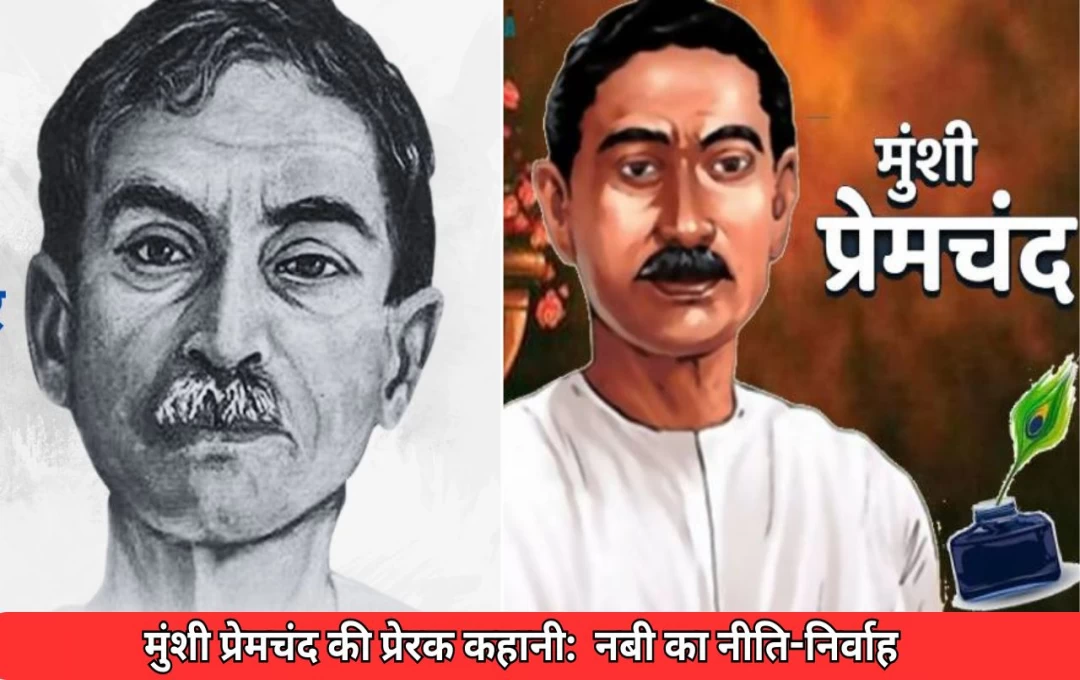Friends, our nation has been a cradle of great individuals—rishis, munis, poets, writers, musicians, and others—for centuries. The countless creations penned by these luminaries are invaluable treasures. Today's youth, in this digital age, seem to be lost, and we are drifting further away from our heritage and precious treasures. subkuz.com consistently strives to bring you not only these invaluable treasures but also captivating stories, news, and insights from across the globe. Presented before you is a poignant and inspiring story by the renowned author, Munshi Premchand.
The Prophet's Adherence to Righteousness
The Prophet Muhammad had received revelation only a short while before; apart from a few neighbors and close relatives, no one else had yet embraced his faith. Even his daughter, Zainab, and son-in-law, Abu al-`As, whose marriage had taken place prior to the revelation, had not yet converted to the new faith. Zainab had visited her paternal home several times and heard her father's teachings. She held Islam in high regard, but due to Abu al-`As, she could not muster the courage to embrace it. Abu al-`As was a proponent of intellectual freedom. He was a skilled merchant, transporting dates, nuts, and other commodities from Mecca to port cities. He was an honest, trustworthy, and hardworking man, whose life was so consumed by the affairs of this world that he had little time to ponder the hereafter. Zainab faced a difficult dilemma; her soul yearned for faith, but her heart was with her husband. She could not abandon her faith, nor could she forsake her spouse. The other members of her household were idol worshippers and adversaries of the new faith. Zainab kept her devotion hidden, not even confiding in her husband. These were not times of religious tolerance. Bloodshed was commonplace. Entire lineages were extinguished. The unmatched bravery of the Arabs manifested in mutual conflicts. There was no concept of political organization. Retribution for bloodshed, for loss of wealth, for insults—all were settled through human blood. In such an environment, to openly declare her religious allegiance would have been to pit herself and her devotion against Abu al-`As's powerful family and the small, select group of Muhammad's followers. Moreover, the bonds of love held her captive. Joining the new faith meant forever parting ways with her beloved husband. The Quraysh tribe viewed mixed marriages as a stain on the family name. Zainab was torn between love and faith, struggling in the bewildering conflict between duty and affection.
Religious devotion is a rare virtue, but when it takes hold, it possesses incredible strength. The sun beat down relentlessly on the earth. The midday heat was so intense that sparks seemed to fly from the eyes of those who gazed at it. The Prophet Muhammad sat in deep contemplation within his home. Despair permeated the atmosphere, a shroud of gloom. Khadija sat beside him, mending a tattered garment. All their worldly possessions had been sacrificed for their devotion. The opposition to Islam grew more vehement each day. Followers of Islam were subjected to various forms of torment. Even leaving the house had become a difficult task for the Prophet, fearing the wrath of the people who might throw stones at him. News arrived that a certain Muslim's house had been plundered; another had been injured by a mob. Hearing these reports, the Prophet was distressed, repeatedly invoking the mercy and patience of the Divine.
The Prophet said, "These people will not allow us to stay here. I can bear it myself, but I cannot bear to see my companions suffer."
Khadija said, "If we leave, these poor souls will have no refuge at all. At the very least, they can come to you and cry out for help in their distress. In hardship, a shoulder to cry on is essential."
The Prophet said, "I don't wish to leave alone. I intend to take all my companions with me. We are scattered. None can come to the aid of another. If we reside in a single place, like a family, no one would dare attack us. With our collective strength, we can become a formidable bhold, an impregnable fortress."
Suddenly, Zainab entered the house. She seemed to be coming from nowhere, with no one accompanying her. Khadija embraced her and asked, "What's wrong, Zainab? Are you well?"
Zainab recounted her inner conflict and asked her father for guidance concerning conversion. The Prophet Muhammad, with tears in his eyes, said, "Zainab, nothing could bring me more joy than this. But I am worried about what will happen to you."
Zainab said, "O Prophet, I have resolved to sacrifice everything for the sake of God. I will not jeopardize my fate in this world."
The Prophet said, "Zainab, the path of God is strewn with thorns."
Zainab replied, "Devotion does not shy away from thorns."
The Prophet said, "Your relationship with your in-laws will be severed."
Zainab said, "My relationship with God will be strengthened."
The Prophet inquired, "What about Abu al-`As?"
Tears welled up in Zainab's eyes. With a heartfelt voice, she said, "Father, this very bond has held me captive for so long. Otherwise, I would have sought refuge with you long ago. I know I cannot survive without him, and I fear his pain at my absence. However, I am confident that one day he will believe in God and I will be blessed to serve him again."
The Prophet said, "Zainab, Abu al-`As is honest, compassionate, and truthful, but his pride might prevent him from acknowledging God. He does not believe in fate, or the soul, or in paradise and hell. He says, 'What need is there of God in the administration of the universe? Why should we fear him? Reason and intellect are sufficient guidance for us.' Such a man cannot accept faith. While it is easy to defeat disbelief, it becomes invincible when it takes on the form of philosophy."
Zainab firmly declared, "Prophet, I want what benefits the soul. I will not allow any human being to stand between me and God."
The Prophet said, "May God have mercy on you, my daughter. Your words have gladdened my heart." He embraced Zainab lovingly.
The next day, Zainab was duly instructed in the principles of Islam and recited the declaration of faith.
Upon hearing this news, the Quraysh were enraged. Good heavens, Islam was spreading! If this continues, its power will grow too great to contend with. The people gathered at Abu al-`As's house. Abu Sufyan, the most prominent among the enemies of Islam (and later a convert), addressed Abu al-`As, saying, "You must divorce your wife."
Abu al-`As replied, "Never!"
Abu Sufyan asked, "Will you become a Muslim?"
Abu al-`As said, "Never."
Abu Sufyan said, "She must remain with Muhammad."
Abu al-`As insisted, "Grant me permission to bring her home."
Abu Sufyan said, "Never."
Abu al-`As said, "Could she not worship God according to her faith within my home?"
Abu Sufyan said, "Never!"
Abu al-`As asked, "Will my people show me no compassion?"
Abu Sufyan said, "Never!"
Abu al-`As declared, "Then cast me out of your society. I will bear any punishment, but I cannot divorce my wife. I do not wish to deprive anyone, including my wife, of the freedom of faith."
Abu Sufyan inquired, "Are there no other women in Quraysh?"
Abu al-`As responded, "There is no one like Zainab."
Abu Sufyan said, "We can present women who would put the moon to shame with their beauty."
Abu al-`As said, "I am not a devotee of beauty."
Abu Sufyan continued, "I can find women who are adept at household management, whose words flow like sweet nectar, who prepare such delightful meals that even the sick would crave them, and whose needlework can transform old clothes into new ones."
Abu al-`As said, "I am not a devotee of any of these qualities. I am a devotee of love alone, and I believe that I cannot find a love like Zainab's anywhere in the world."
Abu Sufyan said, "If it were love, she would not abandon you."
Abu al-`As stated, "I do not wish for love to come at the expense of one's free will."
Abu Sufyan declared, "This means you wish to oppose the society. On my life, the society will not tolerate this transgression. I warn you; if you do not heed my advice, you will regret it." ``` (The remainder of the rewritten content will be provided in subsequent sections due to token limit constraints.)


